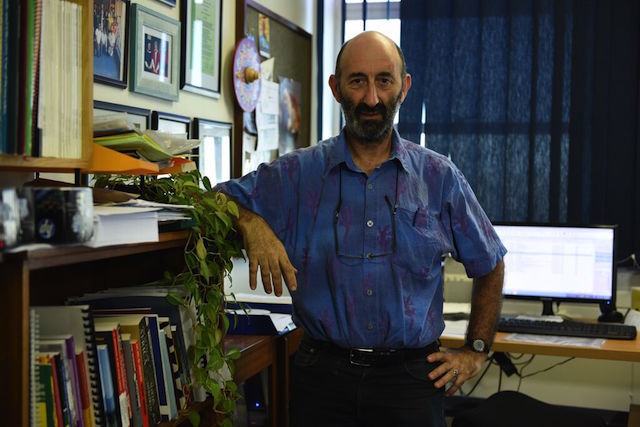Leslie London: farmworkers' health
22 December 2015 | Story Natalie Simon. Photo Michael Hammond.
South African farmworkers remain one of the country’s most vulnerable groups. Farmworkers tend to be poor, illiterate and in poor health. They work long hours in harsh conditions, often for very low pay and in conditions of isolation.
A particular risk farmworkers face is exposure to pesticides. According to the World Health Organisation, over three million people suffer pesticide poisoning annually and of those over 200 000 die each year. The majority of those cases occur in the developing world, largely because of the vulnerability of the rural populations in these countries. In 1996, Professor Leslie London, head of the Division of Public Health Medicine, won the Alan Pifer Award for his research into farmworkers’ exposure to hazardous pesticides.
London’s research has contributed to a number of measures for improved health and safety among rural farmworkers in South Africa. He helped to draft child labour regulations, including a prohibition on children handling pesticides, and made contributions to the country’s pesticide policy. His work led to improved safety systems for farmworkers exposed to pesticides and greater training in pesticide safety in the agricultural sector for workers, employers and public officials in the Departments of Health and Labour.
His research also identified other neurotoxins, such as excessive alcohol consumption, that threaten rural populations. He went on to co-found the non-governmental organisation DOPSTOP with rural nongovernmental organisations (NGOs) and health workers to address alcohol abuse among rural farming populations. His research has contributed to developing capacity to address occupational and environmental health, including environmental justice issues, in rural communities and neighbouring African countries.
A particular risk farmworkers face is exposure to pesticides. According to the World Health Organisation, over three million people suffer pesticide poisoning annually and of those over 200 000 die each year. The majority of those cases occur in the developing world, largely because of the vulnerability of the rural populations in these countries. In 1996, Professor Leslie London, head of the Division of Public Health Medicine, won the Alan Pifer Award for his research into farmworkers’ exposure to hazardous pesticides.
London’s research has contributed to a number of measures for improved health and safety among rural farmworkers in South Africa. He helped to draft child labour regulations, including a prohibition on children handling pesticides, and made contributions to the country’s pesticide policy. His work led to improved safety systems for farmworkers exposed to pesticides and greater training in pesticide safety in the agricultural sector for workers, employers and public officials in the Departments of Health and Labour.
His research also identified other neurotoxins, such as excessive alcohol consumption, that threaten rural populations. He went on to co-found the non-governmental organisation DOPSTOP with rural nongovernmental organisations (NGOs) and health workers to address alcohol abuse among rural farming populations. His research has contributed to developing capacity to address occupational and environmental health, including environmental justice issues, in rural communities and neighbouring African countries.
 This work is licensed under a Creative Commons Attribution-NoDerivatives 4.0 International License.
This work is licensed under a Creative Commons Attribution-NoDerivatives 4.0 International License.
Please view the republishing articles page for more information.
Related
Why South Africa's carbon tax should stay
24 Feb 2026
Republished
Cape Town’s wildflowers: six key insights from a new checklist
19 Feb 2026
Republished









